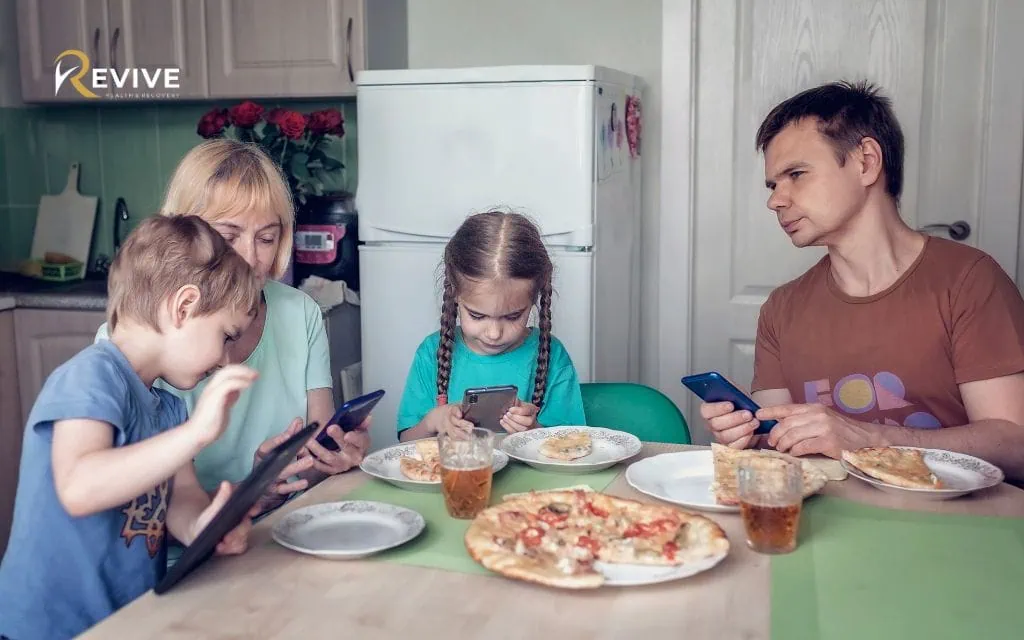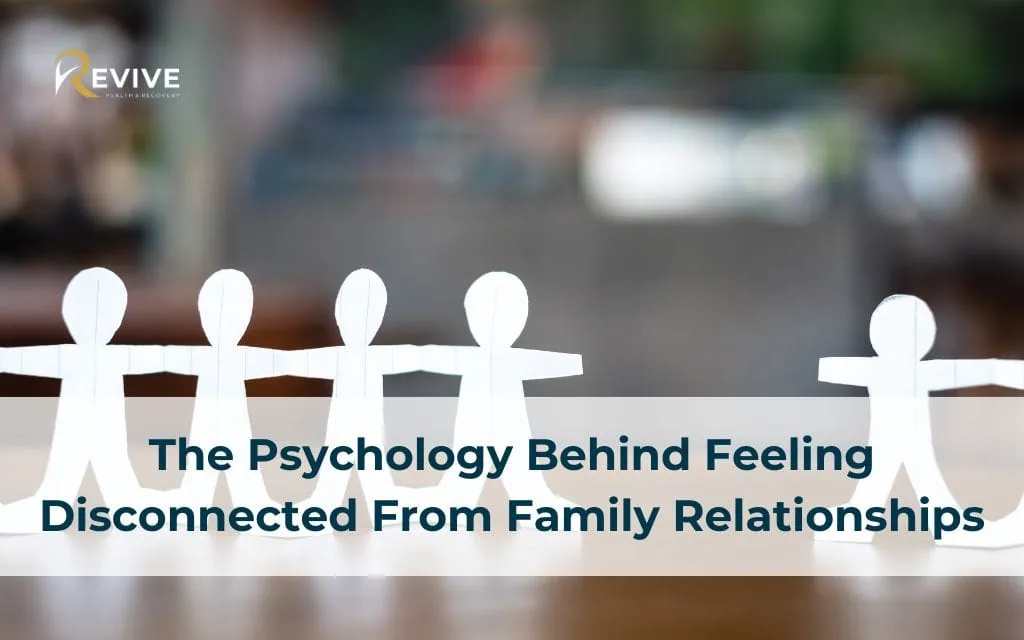Feeling disconnected from your family can leave you questioning everything about your relationships and yourself. You’re not alone in asking, “why do I feel disconnected from my family?” This emotional distance affects approximately 27% of American adults who report feeling emotionally detached from at least one family member.
At Revive Health Recovery, we understand the unique pain of family disconnection. Our Denver-based team specializes in helping individuals navigate these complex family dynamics and find pathways to healing. Whether you feel like an outsider in your own family or struggle with deep emotional detachment, professional support can help you understand and address these challenging feelings.
Many people wonder “why do I feel disconnected from my family” when their relatives seem loving and supportive. This disconnect often stems from deeper psychological factors that require professional understanding and therapeutic intervention.
The Psychology Behind Family Disconnection
Family disconnection isn’t just about occasional disagreements or temporary tensions. It represents a deeper psychological state where emotional bonds feel absent or severely strained. Understanding the root causes can help you make sense of your experience and find hope for healing.
When you ask yourself “why do I feel disconnected from my family,” the answer often lies in complex psychological patterns that develop over years. These patterns create barriers to authentic connection that require professional intervention to address effectively.
Root Causes of Emotional Detachment
Different values and lifestyles often create natural distance between family members. The moment your beliefs, interests, or life choices diverge significantly from your family’s, you might find yourself thinking, “why am i so different from my family?” This divergence doesn’t indicate something wrong with you, it just reflects normal human diversity.
Communication patterns that foster disconnection develop over years. Families who avoid difficult conversations, dismiss emotions, or rely on criticism rather than support create environments where members naturally withdraw. These patterns become deeply ingrained, making authentic connection increasingly difficult.
The question “why do I feel disconnected from my family” becomes more complex when considering childhood experiences that profoundly impact adult relationships. If you experienced emotional neglect, inconsistent caregiving, or trauma during formative years, your attachment style may lean toward avoidance or anxiety.

Family dynamics create templates for all future relationships. When families operate through control, manipulation, or emotional cutoff, members learn to protect themselves through emotional distance rather than healthy boundary setting. This is based on a psychological mechanism identified by family systems therapist Murray Bowen.
The Nuclearization of Family and Its Effects
Modern family structures contribute significantly to isolation. Nuclear families are 60% more likely to experience emotional disconnection than extended family households. In Colorado communities, this shift from extended to nuclear families has created unique challenges for maintaining family bonds.
When “i feel myself” becomes more important than family cohesion, individuation can go too far. Healthy individuation involves developing your own identity while maintaining family connections. However, extreme individuation can lead to emotional cutoff, where family relationships suffer in pursuit of independence.
Understanding “why do I feel disconnected from my family” often involves examining how individuation affects family relationships. The role of individuation in family disconnection requires careful balance between personal growth and maintaining meaningful connections.
When Disconnection Becomes Harmful
Signs your family disconnection is affecting your mental health include persistent feelings of sadness around family interactions, anxiety about family gatherings, or depression that seems tied to family relationships. Studies show that individuals experiencing family disconnection have a 42% higher risk of developing depression and anxiety disorders.
The difference between healthy boundaries and unhealthy disconnection lies in intention and outcome. Healthy boundaries protect your well-being while maintaining the possibility of connection. Unhealthy disconnection involves emotional cutoff that creates isolation and distress.
Why thinking “my family makes me depressed” requires professional attention becomes clear when these feelings persist or interfere with daily life. At Revive Health Recovery, we help clients understand whether their family relationships need therapeutic intervention or simply better boundary management.
The Mental Health Impact of Family Estrangement
Family estrangement creates unique psychological challenges that affect your overall mental health and well-being. Understanding these impacts helps validate your experience and highlights the importance of seeking professional support.
The persistent question “why do I feel disconnected from my family” often reflects deeper mental health impacts that require professional attention. These psychological effects can significantly influence your overall well-being and quality of life.
- Psychological Effects of Feeling Like an Outsider
Depression and anxiety related to family disconnection manifest differently than other forms of mental health challenges. The persistent feeling that you don’t belong in your own family creates a specific type of psychological pain that affects self-worth and identity formation.
How “feeling disconnected from family” affects self-worth runs deep. Families provide our first experiences of love, acceptance, and belonging. When these relationships feel absent or strained, you might question your value as a person. This self-doubt can permeate other relationships and life areas.
The unique emotional toll of “feeling left out by family” creates a particular type of loneliness. Unlike general social isolation, family disconnection involves feeling excluded from your most fundamental relationships. This exclusion can feel especially painful during holidays, celebrations, or family milestones.
When “feeling like an outsider in your own family” becomes trauma, professional intervention becomes essential. Chronic family disconnection can create lasting psychological wounds that affect your ability to form healthy relationships and maintain emotional well-being.
- The Loneliness of Disconnection
Why “disconnect from family” creates a particular type of isolation differs from other forms of loneliness. Family relationships provide a sense of continuity, history, and belonging that other relationships cannot fully replace. When these connections feel severed, the resulting isolation can feel overwhelming.
Many clients at Revive Health Recovery ask “why do I feel disconnected from my family” when exploring how “distant from family” feelings affect other relationships. This disconnection shows the interconnected nature of our emotional lives, where difficulty trusting family members often translates to challenges trusting friends, romantic partners, or colleagues.
The reality of “why am i so different from my family” thoughts often reflects normal human diversity rather than fundamental problems. However, when these differences create persistent disconnection, professional support can help you navigate maintaining your authentic self while building meaningful family connections.
- When Family Becomes a Source of Distress
Understanding “why do i feel uncomfortable around my family” requires examining both your family’s dynamics and your own responses. Sometimes discomfort signals unhealthy family patterns. Other times, it reflects your own anxiety or unresolved issues that therapy can address.
Processing thoughts like “i don’t like my family” and “family sucks” requires compassionate professional support. These intense negative feelings often mask deeper pain, disappointment, or unmet needs. Working with a therapist helps you understand these feelings without judgment.
Family complexity and its influence on mental well-being affects every aspect of your emotional life. Complex family dynamics create ongoing stress that impacts sleep, appetite, concentration, and overall mental health. Addressing these dynamics through therapy can provide significant relief.

Recognizing Unhealthy Family Dynamics
Identifying problematic family patterns helps you understand whether your disconnection reflects healthy boundary-setting or responds to genuinely dysfunctional dynamics. Recognition is the first step toward healing.
When exploring “why do I feel disconnected from my family,” examining family dynamics becomes crucial for understanding whether your feelings reflect normal relationship challenges or more serious dysfunction requiring professional intervention.
Signs of Dysfunctional Family Relationships
Poor communication patterns that cause “family chaos” include constant criticism, emotional manipulation, gaslighting, or complete communication shutdown. These patterns create environments where authentic connection becomes impossible, leading to natural emotional withdrawal.
Control issues and “how to deal with controlling family members” require specific strategies. Controlling behaviors include monitoring your activities, dismissing your feelings, making decisions for you, or using guilt and manipulation to influence your choices. These behaviors naturally create disconnection as you protect your autonomy.
When you feel that “family doesn’t care about me,” examining both family behaviors and your own expectations helps clarify the situation. Sometimes families genuinely lack empathy or support. Other times, different love languages or communication styles create misunderstandings that therapy can address.
Specific Challenging Relationships
Mother-child disconnection manifests through thoughts like “why does my mom hate me” and “why do i feel no connection to my mother.” These relationships often carry intense emotional weight because maternal bonds provide fundamental security. When these relationships feel strained, professional support becomes especially important.
Sibling estrangement, including feeling “i feel uncomfortable around my sister-in-laws,” creates unique challenges. Sibling relationships often continue throughout life, making persistent disconnection particularly painful. Understanding family-of-origin dynamics helps address these complex relationships.
Parent-child dynamics involving “daughter hating mother” and “my mom hates me what do i do” require careful therapeutic intervention. These relationships affect identity formation and self-worth profoundly. Professional support helps navigate these intense emotions constructively.
Family Disintegration Warning Signs
How “family disintegration” happens gradually makes it difficult to recognize until disconnection feels complete. Warning signs include decreased communication, avoiding family gatherings, feeling relief when family interactions end, or dreading family contact.
The social impact of “disconnected families” in Colorado communities affects both individuals and broader social networks. Disconnected families often struggle to provide mutual support during crises, creating additional stress for all members.
When clients ask “why do I feel disconnected from my family” during therapy sessions, we help them recognize when “family adjustment” is needed. Professional intervention can help determine whether adjustment, boundary-setting, or therapeutic separation serves your best interests.
Pathways to Healing Family Disconnection
Healing family disconnection requires intentional effort, professional support, and realistic expectations. Recovery involves understanding your role, improving communication, and sometimes accepting limitations while protecting your well-being.
At Revive Health Recovery, we help clients move beyond asking “why do I feel disconnected from my family” toward developing practical strategies for healing and reconnection that honor both individual needs and family relationships.
Self-Reflection and Understanding
Examining your role in the disconnection doesn’t mean accepting blame. Instead, it involves understanding your patterns, triggers, and responses. This self-awareness helps you make intentional choices about family relationships rather than reacting automatically.
Processing thoughts like “why do i not like my family anymore” and “i don’t love my family” requires professional support. These feelings often reflect disappointment, unmet needs, or protective responses to past hurts. Therapy helps you understand these emotions without judgment.
Understanding your attachment style and how it affects relationships provides crucial insight. Attachment disorders treatment helps you recognize whether your relationship patterns stem from early experiences and how to develop healthier connection patterns.
Communication Strategies for Reconnection
Starting difficult conversations about disconnection requires careful planning and realistic expectations. Begin with your feelings rather than accusations. Use “I” statements to express your experience without blaming family members. Consider professional mediation for particularly challenging conversations.
Setting healthy boundaries without cutting ties involves clearly communicating your needs while remaining open to relationship improvement. Boundary setting differs from punishment by protecting your well-being while maintaining connection possibilities.
When and how to ask for family therapy in Denver depends on your family’s openness and the severity of disconnection. Family systems therapy can help improve communication, heal old wounds, and establish healthier relationship patterns when all parties participate willingly.
Professional Support Options in Colorado
Family therapy resources in Denver include specialized practitioners who understand family disconnection dynamics. At Revive Health Recovery, our therapists use evidence-based approaches to help families rebuild connection while respecting individual needs and boundaries.
Individual therapy for family relationship issues helps you process your emotions, understand family dynamics, and develop strategies for healthier interactions. Even when family members won’t participate in therapy, individual work can significantly improve your family relationships.
Support groups for those experiencing family estrangement provide community and validation. Connecting with others who understand family disconnection reduces isolation and provides practical strategies for healing.
Building New Family Connections
Creating meaningful family connections sometimes involves redefining family, building chosen relationships, and honoring the good while accepting limitations. This process requires creativity, patience, and professional support.
When working with clients who ask “why do I feel disconnected from my family,” our Denver therapists help them explore various approaches to building new and improved family connections that serve their emotional needs and personal growth.
Redefining Family on Your Terms
Creating chosen family connections means building deep, supportive relationships with people who may not share your biology but share your values and provide genuine care. These relationships can supplement or sometimes replace biological family connections.
Nurturing the relationships that work, including situations where “dad is my best friend,” helps you focus energy on positive connections rather than painful ones. Strengthening good family relationships provides a foundation for healing other connections.
Finding meaning in “family adult” relationships involves accepting that adult family relationships differ from childhood connections. Adult family relationships require mutual respect, clear boundaries, and recognition that everyone has changed and grown.

Finding Support Outside Traditional Family Structures
Community resources in Colorado for building connections include support groups, volunteer organizations, religious communities, and recreational activities. These connections provide the belonging and support that families ideally offer.
Support groups in Denver for those dealing with family estrangement offer specific understanding and practical strategies. At Revive Health Recovery, we facilitate groups that help participants process family disconnection while building new supportive relationships.
Creating your own support network when “what to do when your family doesn’t want you around” becomes necessary involves intentionally building relationships that provide emotional support, practical help, and genuine connection.
Honoring Departed Family Members
Processing grief and disconnection involving “my mother in heaven” creates unique challenges. Losing family members before reconciliation occurs requires specific grief work that honors both your feelings and the deceased person’s memory.
Finding closure with estranged family members who have passed involves accepting that some relationships cannot be repaired. Therapy helps you process complex emotions including guilt, regret, relief, and ongoing love despite disconnection.
Building connection through family legacy despite disconnection means focusing on positive traits, values, or traditions you want to continue while leaving behind harmful patterns that created disconnection.
FAQs About “Why Do I Feel Disconnected From My Family”?
Why do I feel no emotional connection to my family even though they haven’t done anything wrong?
Many factors contribute to emotional disconnection, including different personality types, communication styles, attachment disorders, and unmet emotional needs. This feeling doesn’t indicate anything wrong with you or your family. Revive Health Recovery specializes in helping Denver residents understand and address these complex dynamics through personalized therapy approaches.
Is it normal to feel like an outsider in your family?
Yes, feeling like an outsider is more common than many realize. Differences in interests, values, personality traits, and life experiences create emotional distance even in loving families. Our Denver therapists help clients understand these feelings and develop strategies for building stronger connections while maintaining authentic identity.
Can therapy help with family disconnection issues in Denver?
Absolutely. Revive Health Recovery offers comprehensive family therapy services in Denver, including family systems therapy, cognitive behavioral therapy, and trauma-informed care. Our specialized approach helps identify communication patterns, heal past wounds, and build stronger connections tailored to your unique family situation.
Is cutting off contact with toxic family members ever appropriate?
Sometimes establishing firm boundaries, including limited contact, becomes necessary for mental health and well-being. Our Denver mental health professionals help you navigate this difficult decision through careful assessment of your family dynamics and personal needs. We provide ongoing support throughout this process.
How can I rebuild connection with family members after years of distance?
Rebuilding connection requires patience, realistic expectations, and often professional guidance. Our Revive Health Recovery team helps clients develop communication techniques, boundary setting skills, and reconnection strategies. We provide both individual and family therapy options to support your healing journey in the Denver area.
Why Choose Revive Health Recovery for Family Disconnection Treatment
Understanding “why do I feel disconnected from my family” requires professional expertise and compassionate support. At Revive Health Recovery, we specialize in helping Colorado residents navigate complex family dynamics and find pathways to healing.
Our experienced team understands that asking “why do I feel disconnected from my family” represents the beginning of a healing journey that requires professional guidance, evidence-based treatment, and ongoing support to achieve lasting change.
Our Specialized Approach to Family Relationship Healing
Evidence-based therapies for family reconnection include attachment theory applications, emotional intelligence development, family systems therapy, and intergenerational trauma treatment. Our Denver team uses these proven approaches to address the root causes of family disconnection.
Individual and group support options provide flexibility for your healing journey. Whether you prefer one-on-one therapy or benefit from group support, we offer comprehensive mental health services Colorado residents trust for family relationship healing.
Trauma-informed care for family estrangement recognizes how past experiences affect current relationships. Our approach addresses childhood trauma, emotional neglect, and attachment disorders that often contribute to family disconnection.
5 Reasons to Choose Revive Health Recovery
Specialized understanding of family disconnection issues sets us apart from general therapy providers. Our team specifically focuses on family relationship challenges, providing targeted expertise for complex family dynamics affecting Denver area residents.
Compassionate, non-judgmental therapeutic environment ensures you feel safe exploring difficult emotions and family experiences. We understand that family disconnection involves complex feelings that require sensitive, professional support.
Personalized treatment plans addressing your unique family situation recognize that every family disconnection involves different factors, histories, and goals. Our individualized approach ensures your specific needs guide your treatment plan.
Denver-based expertise with understanding of local family dynamics includes recognition of how geographic mobility, Colorado culture, and regional factors affect family relationships in our community.
Proven success in helping clients rebuild meaningful family connections demonstrates our commitment to lasting healing rather than temporary solutions. Our evidence-based approaches consistently help clients improve family relationships and overall mental health.
Our Commitment to Your Healing Journey
How we support lasting family reconnection involves comprehensive care that addresses immediate concerns while building long-term relationship skills. Our commitment extends beyond crisis intervention to sustainable healing and growth.
Building communication and boundary-setting skills provides tools for navigating future family challenges. These skills help you maintain healthy relationships while protecting your emotional well-being.
Creating sustainable relationship patterns means changing destructive family dynamics into healthier interactions. Our therapeutic approach helps you develop new ways of connecting that serve everyone’s needs.
Take the First Step Toward Healing Your Family Relationships
Feeling disconnected from your family doesn’t have to define your future. Understanding why you feel disconnected from your family represents the first step toward healing these important relationships. At Revive Health Recovery, we provide the professional support, evidence-based treatment, and compassionate care you need to navigate family disconnection and build meaningful connections.
Our Denver-based team understands the unique challenges facing Colorado families dealing with disconnection, estrangement, and communication difficulties. Whether you’re struggling with childhood trauma, attachment disorders, or simply need help improving family communication, we offer personalized treatment plans designed to meet your specific needs.
Don’t let the persistent question “why do I feel disconnected from my family” continue affecting your mental health and overall well-being. Professional support can help you understand your family dynamics, process difficult emotions, and develop strategies for healthier relationships. Our experienced therapists specialize in family reconnection and emotional healing, providing the tools you need for lasting change.
Ready to begin your healing journey? Contact Revive Health Recovery today at (303) 268-4655 to schedule a consultation with our family therapy specialists. Our compassionate team is available 24/7 to answer your questions and help you take the first step toward rebuilding meaningful family connections. You deserve relationships that support your growth and well-being, just let us help you create them.
Remember, healing family disconnection takes time, but with professional support and evidence-based treatment, meaningful change is possible. Stop asking “why do I feel disconnected from my family” and start taking action toward healing. Reach out today and discover how Revive Health Recovery can help you transform your family relationships and improve your overall quality of life.



